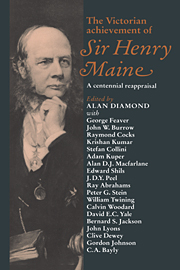Book contents
- Frontmatter
- Contents
- Notes on contributors
- Foreword by Sir John Lyons
- Introduction
- 1 The Victorian values of Sir Henry Maine
- PART 1 MAINE AND THE IDEA OF PROGRESS
- 2 Henry Maine and mid-Victorian ideas of progress
- 3 Maine, progress and theory
- 4 Maine and the theory of progress
- 5 Democracy and excitement: Maine's political pessimism
- PART 2 MAINE AND THE SOCIAL SCIENCES
- PART 3 MAINE ON LAW, LEGAL CHANGE AND LEGAL EDUCATION
- PART 4 MAINE AND INDIA
- Appendix: the conference programme
- Bibliography
- Index
5 - Democracy and excitement: Maine's political pessimism
Published online by Cambridge University Press: 04 September 2009
- Frontmatter
- Contents
- Notes on contributors
- Foreword by Sir John Lyons
- Introduction
- 1 The Victorian values of Sir Henry Maine
- PART 1 MAINE AND THE IDEA OF PROGRESS
- 2 Henry Maine and mid-Victorian ideas of progress
- 3 Maine, progress and theory
- 4 Maine and the theory of progress
- 5 Democracy and excitement: Maine's political pessimism
- PART 2 MAINE AND THE SOCIAL SCIENCES
- PART 3 MAINE ON LAW, LEGAL CHANGE AND LEGAL EDUCATION
- PART 4 MAINE AND INDIA
- Appendix: the conference programme
- Bibliography
- Index
Summary
This chapter, which is intended to complement that by Professor Burrow (Chapter 2), deals largely with the obverse of Maine's theory of progress, namely his pessimism about future stagnation or decline. This strategy necessarily entails concentration upon Maine's later work, especially Popular Government, in contrast to Professor Burrow's chapter, which naturally focusses upon Ancient Law and its various offshoots.
Needless to say, all accounts of progress involve, at least implicitly, some characterization of stagnation, retrogression and decline; and, perhaps a slightly less obvious point, theories of progress are one very effective form of social or cultural criticism in that they are attempts to endow with some kind of scientific or moral authority the discrimination of those current social and cultural developments that are welcome from those that are not. A special piquancy attends the politically conservative varieties of this kind of criticism, where the future figures more as a source of alarm than of hope, and where the last ‘healthy’ stage of cultural growth tends to coincide with that of the critic's own youth. Looking at Maine in this way, as a pessimistic or conservative social critic and political theorist, I want very briefly to raise three points for examination. The first concerns the way in which his account of both progress and its opposite rests upon certain moral categories, especially qualities of character.
- Type
- Chapter
- Information
- The Victorian Achievement of Sir Henry MaineA Centennial Reappraisal, pp. 88 - 96Publisher: Cambridge University PressPrint publication year: 1991

